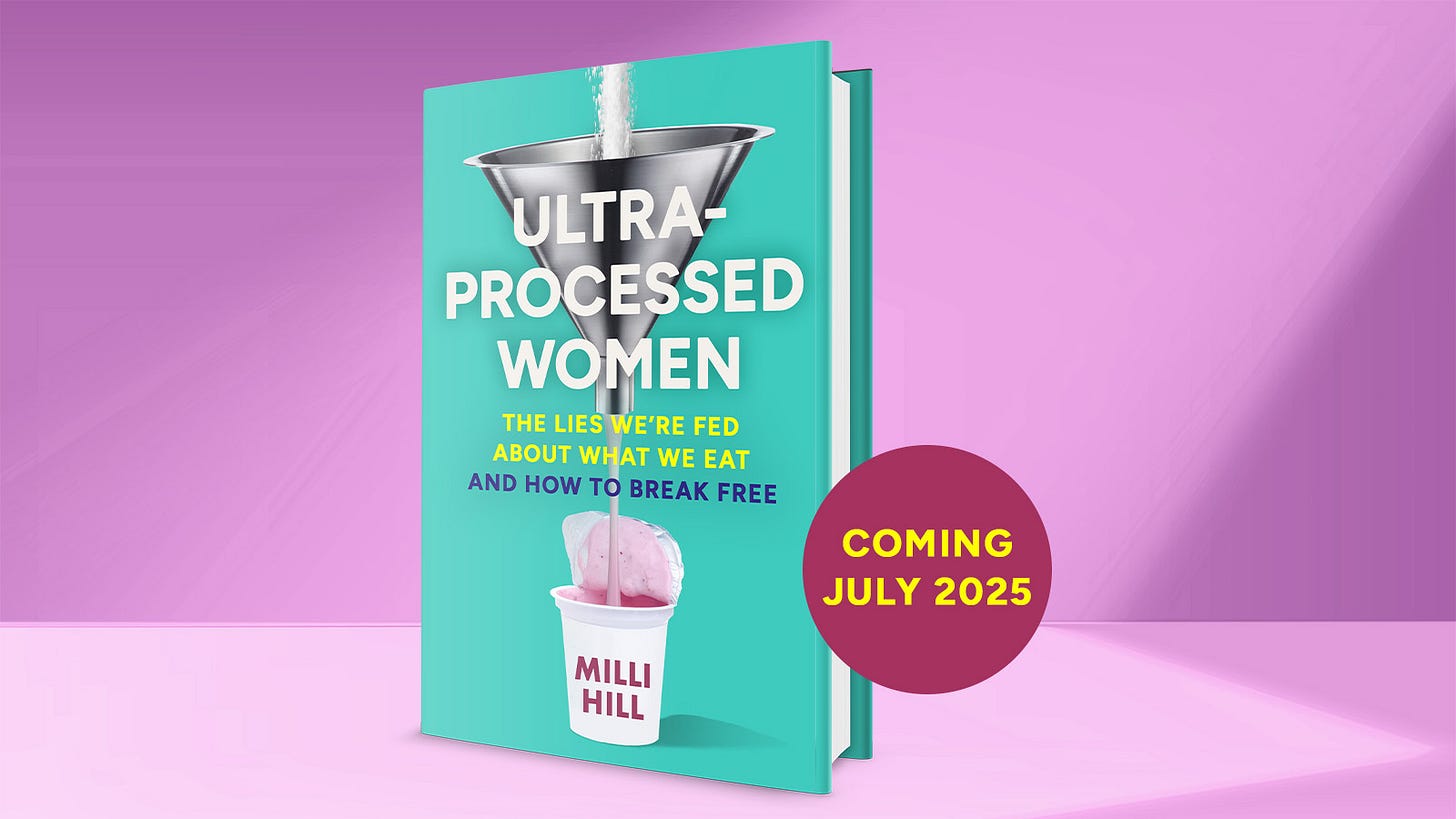There’s an interesting paradox in women’s healthcare: our bodies are both poorly understood and highly medicalised. Many of us are now familiar with the ‘gender knowledge gap’ - caused by decades of scientists treating the male body as the default, and focusing primarily on the workings and responses not just of men, but of male mice, and even male cells. Most of us, especially if we are female, also know that there is a pill, potion or treatment for every stage of our lives - from menarche to menopause, and everything in between. You could be forgiven for thinking, at times, that being female is the ‘short straw’, and that the female body is something of a problem to be fixed.
Through a couple of decades of writing I have noticed again and again how often the answer to questions I may have about women’s health is simply, ‘We don’t really know’. I noticed this in particular when I was writing My Period, my puberty guide for pre-teen girls. I realised not just how little we know about women’s bodies, but how many of the things we think we do know - women’s bodies are in synch with the moon, or women’s cycles synch up when they live in the same house, for example - just don’t have any evidence to support them. Because nobody has ever bothered to investigate, basically.
When writing and campaigning about childbirth, I thought a lot about how nobody ever really seemed able to explain why one woman could give birth like she was shelling peas but another woman had to have repeat caesareans. I had my second and third at home, with ease, and was told, “Oh, you’re lucky!”. This reminded me of how, at school, some girls had an awful time with their periods but others breezed along, again, some were ‘lucky’ and others ‘unlucky’. Likewise, with breastfeeding, some women are ‘lucky enough to be able to’, or sadly, it doesn’t ‘work’ for them. They haven’t particularly managed to medicalise breastfeeding issues, of course, but they have developed a 55 billion dollar global industry to replace it - now who’s lucky?
So, “we don’t really know how your body works, but we do have a profit-making solution for its multitude of problems”, seems to be the gist of it. I’d be thinking about this for a couple of decades by the time I hit menopause, another time of life in which women can be lucky or unlucky. Some are side swiped and have to take time off work for a multitude of difficult symptoms; others fare better, and this seems to be the case even for those who take HRT. “I was lucky, HRT worked really well for me”, “I was lucky, I didn’t need HRT”, etc. etc.
My menopause happened hard and fast - after my first covid jab in May 2021, my periods completely stopped, and never really got going again. They revved their engines somewhat half heartedly a couple of times, but basically, that was that. I don’t want to get into the long grass of discussions about the covid vaccine by the way, and it could be that my menopause was going to happen like that anyway and that the timing of the jab was a complete coincidence. But it does seem to be the case that many women’s menstrual cycles were affected by the vaccination - over 40 thousand UK women, for example, reported menstrual irregularities via the yellow card system. All I can say for sure is that it’s possible that I was affected.
By April 2024 I was officially post menopausal, having not had any sign of a period for an entire year. During those three years between my first cycle irregularities in summer 2021, and my ‘menopause day’ in 2024, I’d been writing a book, The Body Myth (working title), which at the moment is completed and sat in my laptop (and on file with my editor at Harper Collins) and due to come out in 2026. When I had the idea to write Ultra Processed Women, the publishers asked me if I would mind shelving The Body Myth and getting Ultra Processed Women out first (because it’s a bit more time sensitive and ‘zeitgeisty’). And it was during the writing of The Body Myth that I started to think about food - no, not the usual way I do when sat at my laptop dreaming of Cadbury’s Mini Rolls at around 11.42am - but the impact of food on women’s health.
It all started with a simple google. I typed in:
How do women experience menopause in other cultures?
and it was like a brilliantly bright lightbulb suddenly went on.
I learned that until recently there was no word for ‘hot flush’ in Japanese, so rare is this condition in Japanese women. I discovered that other countries also report fewer vasomotor symptoms (that’s the overall ‘hotting up’) than women in the West, with only 5 per cent of Indonesian women, for example, reporting hot flushes. Some report different symptoms instead, with body and joint pain reported as the predominant issue in many Asian countries. And it’s not just Asia – the First Nations women in Canada, for example, were said by researchers not to ‘conceptually link’ menopause to ‘symptoms typical of menopause from a medical perspective’ and explained that they did not have a word for ‘menopause’. Mayan women from Yucatán in Mexico reported no symptoms of menopause at all, and the women of the Hadza in Tanzania, one of the world’s last remaining hunter-gatherer populations, reported only one: vaginal dryness. The Hadza also have no word for menopause.
In trying to explain why this might be, some researchers point to cultural values: in the West, women tend to feel that youth, beauty and fertility signify worth, and therefore menopause is something to be feared - an ending, a loss, a negative transition. Other countries frame things differently – in Japan, menopause is called konenki, which translates as ‘time of renewal and regeneration’; in China, it is known as second spring; in the Māori language, a woman becomes ruahine, which signifies ‘second woman’ and also ‘woman of importance’ or ‘wise woman’. It’s possible that when menopause is seen, not as our demise, but as some kind of upgrade or promotion, women tend to feel more positively towards it and therefore less likely to feel they are ‘suffering’, even at a physical level.
But mindset is not the only explanation. There’s one other big difference between the women in the world having the worst time during their late 40s and 50s - mainly in the UK, USA and Australia - and those who are so unphased they barely have the vocab to describe it: diet. If you’ve ever read about the world’s Blue Zones, those places with the highest concentration of people who live to 100 or even 110 (mostly women by the way), then you’ll know that Pringles and Mr Kipling are also words they don’t have in their dictionary. In one Blue Zone, Okinawa in Japan, they have the highest ratio of centenarians and supercentenarians in the world, and their diet is only 2% fish or meat, with the rest being made up vegetables, legumes, rice, and a lot of sweet potatoes. They also eat foods made with soy, like tofu and miso, and it’s this in particular that researchers speculate could be the cause of their easier menopause, because soy contains phytoestrogens, compounds that have a very similar structure to oestrogen. It’s oestrogen that drops in menopause, and it’s this drop that causes the various symptoms.
Once I’d begun to learn more about menopause in other cultures I started to experiment on myself, not only paying attention to my own mindset but also eating as many phytoestrogens as I could, in particular ground flax seeds (I don’t much like soy products). It was during this experimental phase that I started to hear more about ultra processed food (UPF), and another lightbulb went on. Maybe whacking a bit of flaxseed in your breakfast wasn’t really going to help if the rest of your diet was high in ultra processed food (UPF)? And maybe diet was yet another area that women - and health care providers - over-look whilst enduring their ‘unlucky’ health issues? The idea for Ultra Processed Women was born.
When you eat UPF, not only are you potentially causing issues by consuming a lot of ingredients that the human body doesn’t technically recognised as ‘food’, you are also filling yourself up with UPF and therefore not hungry for whole foods. Put simply, if you have that Mini-Roll at 11.45am, you’re missing out on the handful of nuts and an apple you might have instead. And your menopausal body needs that whole plant fibre, for example to keep your oestrobolome happy - the part of your gut microbiome that metabolises and modulates oestrogen.
Recent research from Zoe has found that eating a healthy diet low in UPF and high in whole foods and plants can reduce menopause symptoms by as much as 34%, in both women taking and not taking HRT.
I wonder if you’re waiting for me to tell you whether or not I took HRT?
The truth is, I didn’t. Or at least, I haven’t yet. But my own personal experience and choices really aren’t the point. The point is, all women can improve their menopause experience by thinking about what they eat. And as with all women’s health, the narrative of the female body as a ‘slightly defective item hastily crafted from a spare rib’ can stop that thought from even occurring to people. So fixed are we in the mindset that ‘being female is unlucky’, that we can often just ‘swallow the pill’ without question. And if the pill doesn’t work - more bad luck.
If you’re menopausal (or for that matter suffering any other kind of health issue) and not convinced that what you eat can make a difference, I challenge you to give it a try. No need to stop any other treatments or medication by the way! But for a fortnight, stop eating UPF, and eat as many whole foods and plants as you can. Fresh meals cooked from scratch. And see what happens. This is a risk free strategy to your health and you may even enjoy it.
Not sure what UPF actually is? On Friday this week I’m going to be going live for the first time on Substack and explaining this, because I know there’s a bit of confusion. Join me at 6.30pm UK time on Friday 6th June. You’ll need the Substack app…
And you need to make sure your push notifications (that’s the little pop ups in your phone) are switched on, if you want to be reminded when I go live at 6.30pm. I will share the recording but I’d love it if you would join me as it happens, and you’ll be able to ask questions. Hope to see you there.
As the countdown begins to publication of my new book, Ultra Processed Women, there’s going to be a ‘topic takeover’ here on WHAT ABOUT WOMEN, between now and publication date on 3rd July. I’ll be sharing posts like this one that hopefully get you thinking about different areas where our current UPF diet is having an impact, along with news of the book, publicity, launch, reviews and more.
I’ll also be going live (gulp, terrifying!) to chat to you about the book, too. I’m glad to have you here, and look forward to any questions and thoughts you may have in the comments. For those of you who look forward to The Word is Woman on Fridays, I’ve lifted the paywall on all 70 of the posts in there, so hopefully you can keep yourself happy looking through the archives until it returns later this summer.








Fabulous Milli! I’m 57 and about 3 months shy of my potential menopause moment. I don’t take HRT and probably won’t, very aware of how nutrition and lifestyle can change my symptoms, or help them. I try to follow a healthy (sans UPF) diet and do cross fit several times a week( weight training with cardio). I do get some serious hot flushes, but I don’t mind them that much. I find then curios and kind of fascinating, a bit like a rite of passage. I’ll definitely get your book, Ultra Processed Woman, and the one that comes out in 2026! 🙏🏽
In the past 125 years we have extended life expectancy in the industrialized world from age 50 to about 80. As a result, much larger swaths of women are now living three or more decades with estrogen levels that on average are below the levels found in men. Pre-menopausal women’s estrogen levels, in contrast, are 5-10x the levels found in men. Women experience a profound and permanent decline in their estrogen levels starting in mid-life, when their reproductive capacity ends. Nothing even remotely like this happens to men’s testosterone levels.
It’s interesting to look up the reference ranges for estrogen in men (10-50 picograms per milliliter of blood serum) versus menopausal women (0-20). A reference range that starts at zero effectively defines estrogen deficiency out of existence for menopausal women.
I wholeheartedly support eating good, real food because the health impacts are numerous and positive. But eating like a Tibetan monk would not have spared me the 20 hot flashes I had each day from age 47 to 53, when I (with skepticism and trepidation) went on menopausal hormone therapy at the (second) gentle suggestion of my gynecologist. At that visit, after increasingly painful pelvic exams over the years, the speculum was covered with blood when she removed it. I clearly had GSM, despite my healthy diet and active lifestyle.
Amazingly enough, hot flashes were the only thing I connected to menopause. But I was experiencing a host of other things, some of which I now realize I errantly attributed to simple aging:
—Sexual function that gradually moved from 100% to zero from pre-menopause to menopause
—Loss of energy
—Loss of ability to sustain logical, complex trains of thought
—A serious blunting of all emotion, to the point where emotions seemed alien and I recoiled when I witnessed them in other people
—Anxiety attacks (for the first time in my life)
—An overarching, persistent sense of doom where there was only bleakness when contemplating the future and a sense of failure when contemplating the past
—Loss of confidence in my ability to carry out the work of my profession
Within 10 days of starting an estrogen patch, every single one of these distressing symptoms completely vanished, and the hot flashes stopped. That was 10 years ago, and I’ve never looked back.
This experience has convinced me that thinking of estrogen as a sex and reproductive hormone is incomplete at best and misleading at worst. “Sex” hormones are multi-taskers, playing important roles in maintaining the health of many systems of the body, from the brain, to the heart, to the bones.
Women’s bodies are not flawed. They’re amazing. Unlike men, though, women’s lifespans in this day and age are much longer than their reproductive lifespans. If estrogen is a hormone that maintains the health of the whole body, I don’t think it’s stretch to see MHT as helping to maintain health and function as we grow old.